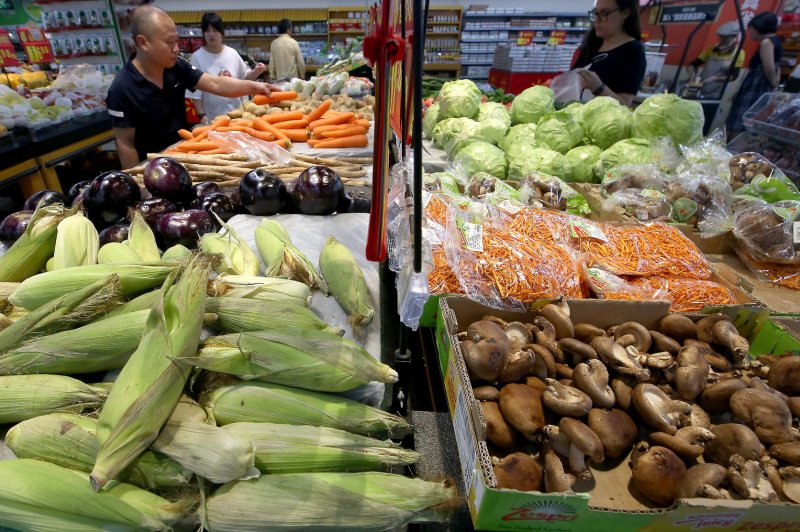Vegetables offer a lot of health benefits, but may not slow prostate cancer progression. File photo by Stephen Shaver/UPI |
License Photo
Jan. 14 (UPI) -- Eating vegetables offers a lot of health benefits -- but it doesn't slow the progression of prostate cancer.
The finding, reported in a study published Tuesday in the Journal of the American Medical Association, follows an experimental program designed by the UC San Diego Moores Comprehensive Cancer Center in which men with prostate cancer received nutritional consultation over the telephone.
The consultation encouraged consumption of at least seven daily servings of vegetables or fruit -- defined as a half-cup of raw or cooked vegetables or fruits or 100 percent vegetable juice, including at least two servings each of cruciferous vegetables, like cabbage, and tomatoes.
A similar program was found to be effective at improving the all-around diets of breast cancer survivors.
"One of the most common questions I receive from patients is, 'Are there any changes I can make to my diet to help fight the cancer?'" study co-author J. Kellogg Parsons, a professor of urology at Moores UC San Diego Comprehensive Cancer Center, told UPI. "Diets boosted by extra vegetables provided no disease-specific benefits to patients with prostate cancer. This finding runs contrary to prevailing scientific and public opinion. Nevertheless, we also demonstrated -- for the first time -- that a simple, inexpensive, and convenient behavioral intervention can lead patients with prostate cancer to make healthier food choices."
The study, however, was not built around how the dietary choices of prostate cancer patients influenced their overall health. Rather, the idea, Parsons said, was an assessment of a structured, "behavioral intervention, grounded in the field of social psychology" that was designed to "nudge" patients with prostate cancer toward healthier food choices.
The final analysis of the Men's Eating and Living, or "MEAL," Study included 443 men between 50 and 80 years of age from 91 U.S. urology and medical oncology clinics across the country who had biopsy-confirmed prostate adenocarcinoma. In all, 226 of the study subjects received the dietary consultation, while the remaining 217 participants received only written information about diet and prostate cancer.
Over the two-year study period, 245 study participants had their cancer progress, with a relatively equal distribution in both groups -- 124, or 55 percent, in the dietary intervention group and 121, or 56 percent, in the control group. The researchers also found that there were no significant differences in time to cancer.
Based on self reporting by the study participants, however, those who received dietary consultation did increase their intake of fruits and vegetables by a mean of two servings per day. Blood tests revealed that those in the dietary intervention group also had roughly 25 percent higher levels of plasma carotenoid -- a biomarker for vegetable intake -- than those in the control group.
"Diet is not a 'magic bullet' for treating prostate cancer," Parsons said. "But it's also worth noting that while a healthy diet rich in fruits and vegetables may not cure cancer, it will likely keep the body stronger and healthier, which may help patients better tolerate cancer treatments."















